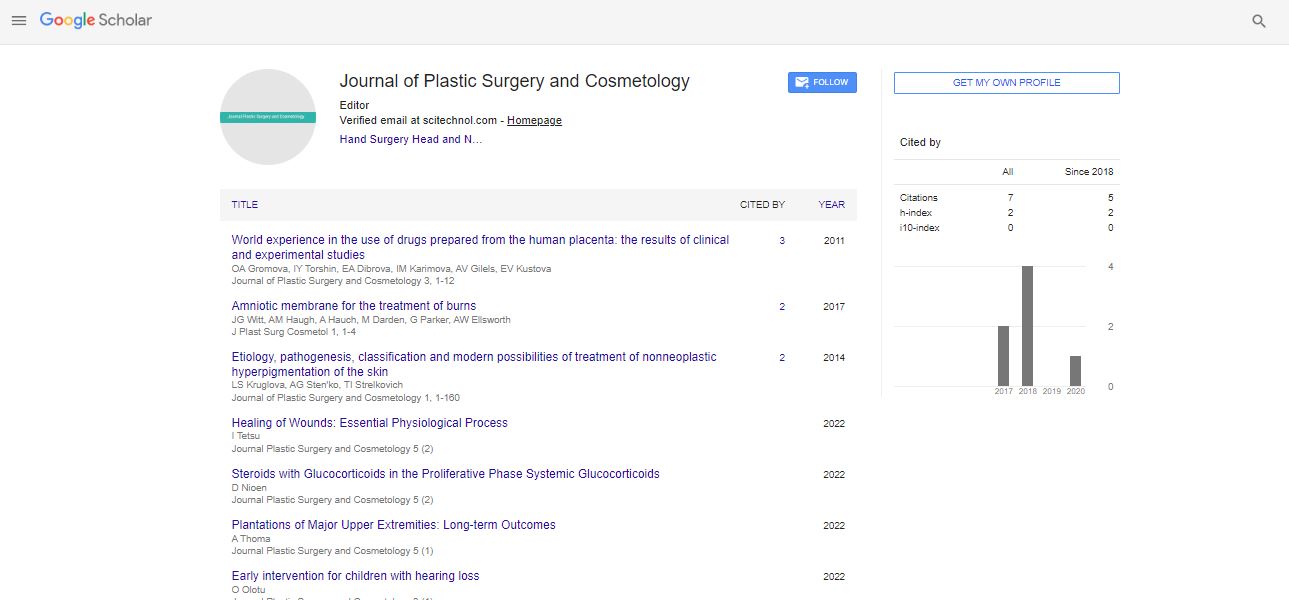Perspective, J Pls Sur Cos Vol: 12 Issue: 1
An Overview on Skin Cancer and its Prevention Methods
Hye Kim*
1Department of Integrative Biotechnology, Sungkyunkwan University, Suwon, Republic of Korea
*Corresponding Author: Hye Kim
Department of Integrative Biotechnology, Sungkyunkwan University, Suwon,
Republic of Korea
E-mail: kimkjhml@skku.kr
Received date: 20 February, 2023, Manuscript No. JPSC-23-93368;
Editor assigned date: 23 February, 2023, Pre QC No. JPSC-23-93368 (PQ);
Reviewed date: 09 March, 2023, QC No. JPSC-23-93368;
Revised date: 16 March, 2023, Manuscript No: JPSC-23-93368 (R);
Published date: 23 March 2023, DOI: 10.4172/JPSC.100037.
Citation: Kim H (2023) An Overview on Skin Cnacer and its Prevention Methods. J Pls Sur Cos 12:1.
Keywords: Aesthetic Surgery, Breast Augmentation, Breast Reconstruction
Description
Skin cancer is the most common type of cancer worldwide, accounting for nearly half of all cancers diagnosed. It occurs when skin cells are damaged by Ultraviolet (UV) radiation from the sun or other sources such as tanning beds. Skin cancer can occur anywhere on the body, but it most commonly occurs on sun-exposed areas of the skin, such as the face, neck, arms, and legs.
There are three main types of skin cancer, basal cell carcinoma, squamous cell carcinoma and melanoma. Basal cell carcinoma is the most common form of skin cancer, accounting for approximately 80% of all cases. It usually appears as small raised bumps, giving it a pearly or waxy appearance. Squamous cell carcinoma is the second most common type of skin cancer, accounting for approximately 16% of cases. It often presents as red, scaly patches or sores that do not heal. Melanoma is rarer than basal cell carcinoma and squamous cell carcinoma, but it is also more dangerous. It can spread rapidly to other parts of the body and is responsible for most skin cancer deaths.
The main cause of skin cancer is ultraviolet rays from the sun and solariums. UV rays can damage Deoxyribonucleic Acid (DNA) in skin cells and cause cancer-causing mutations. Other risk factors for skin cancer include fair skin, a family history of skin cancer, a history of sunburn, and a weakened immune system.
Preventing skin cancer means protecting the skin from UV rays. This can be achieved by wearing protective clothing such as hats and long-sleeved shirts, and using sunscreen with Sun Protection Factor (SPF) 30 or higher. It's also important to avoid tanning beds that can emit high levels of UV radiation. Regular skin examinations are also important. This is because it helps detect skin cancer early when it is most treatable.
Treatment for skin cancer depends on the type and stage of the cancer. In many cases, skin cancer can be removed through surgery. Other treatment options include radiation therapy, chemotherapy, and immunotherapy. The type of treatment used will depend on the individual's health, the size and location of the cancer, and other factors.
Despite the seriousness of skin cancer, it is highly preventable. By taking steps to protect the skin from UV radiation, such as wearing protective clothing and using sunscreen, individuals can greatly reduce their risk of developing skin cancer. Early detection is also a key, as it can greatly increase the chances of successful treatment.
Skin cancer is a serious and potentially life-threatening condition caused by exposure to ultraviolet light. To reduce the risk of developing skin cancer, it is important to take steps to protect the skin from the sun and other sources of ultraviolet radiation. Regular skin examinations and early detection also increase the chances of successful treatment. It is important because it can significantly increase. By taking these steps, individuals can help prevent skin cancer and stay healthy. Spanish
Spanish  Chinese
Chinese  Russian
Russian  German
German  French
French  Japanese
Japanese  Portuguese
Portuguese  Hindi
Hindi 